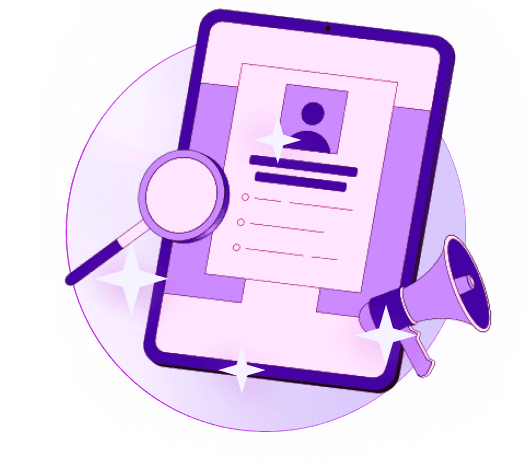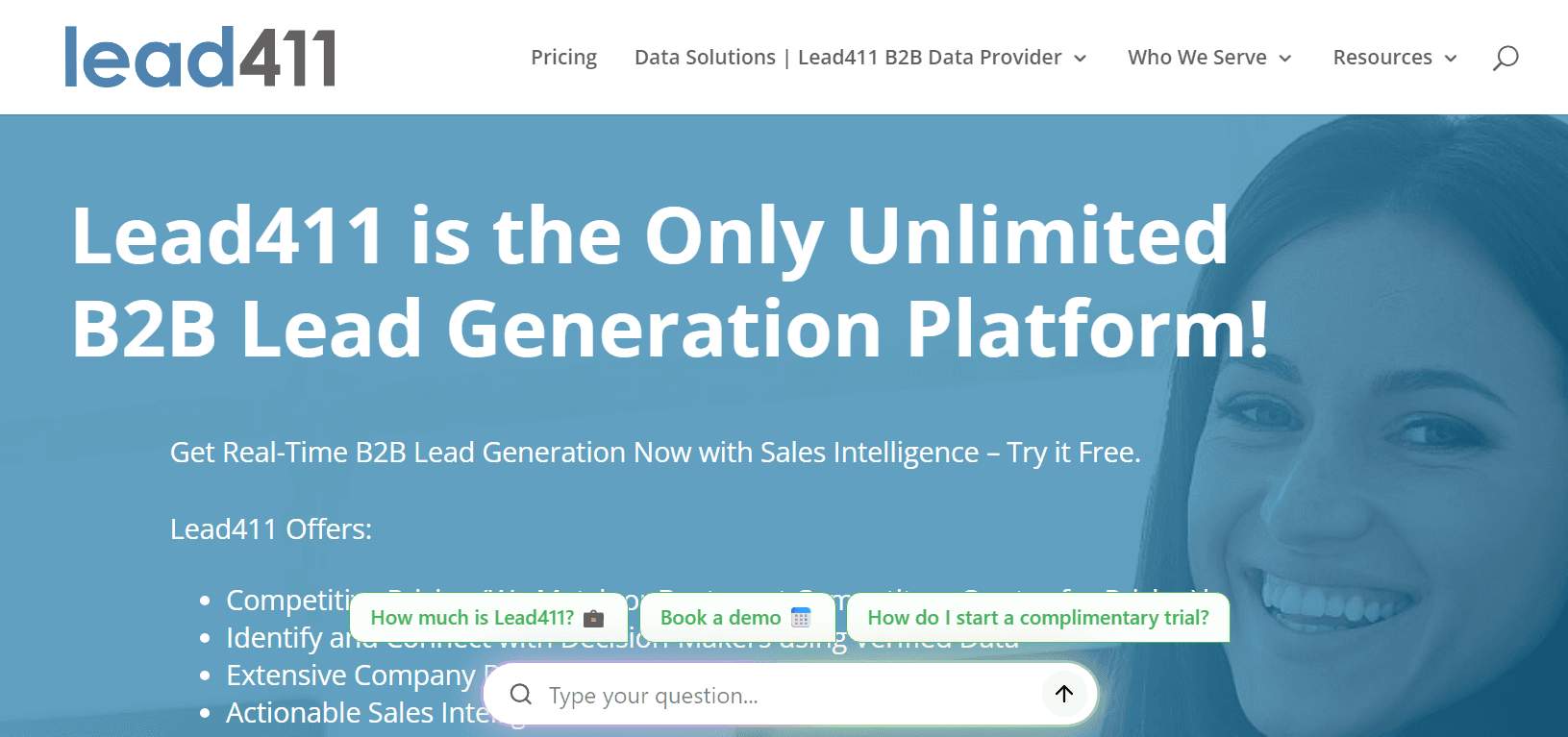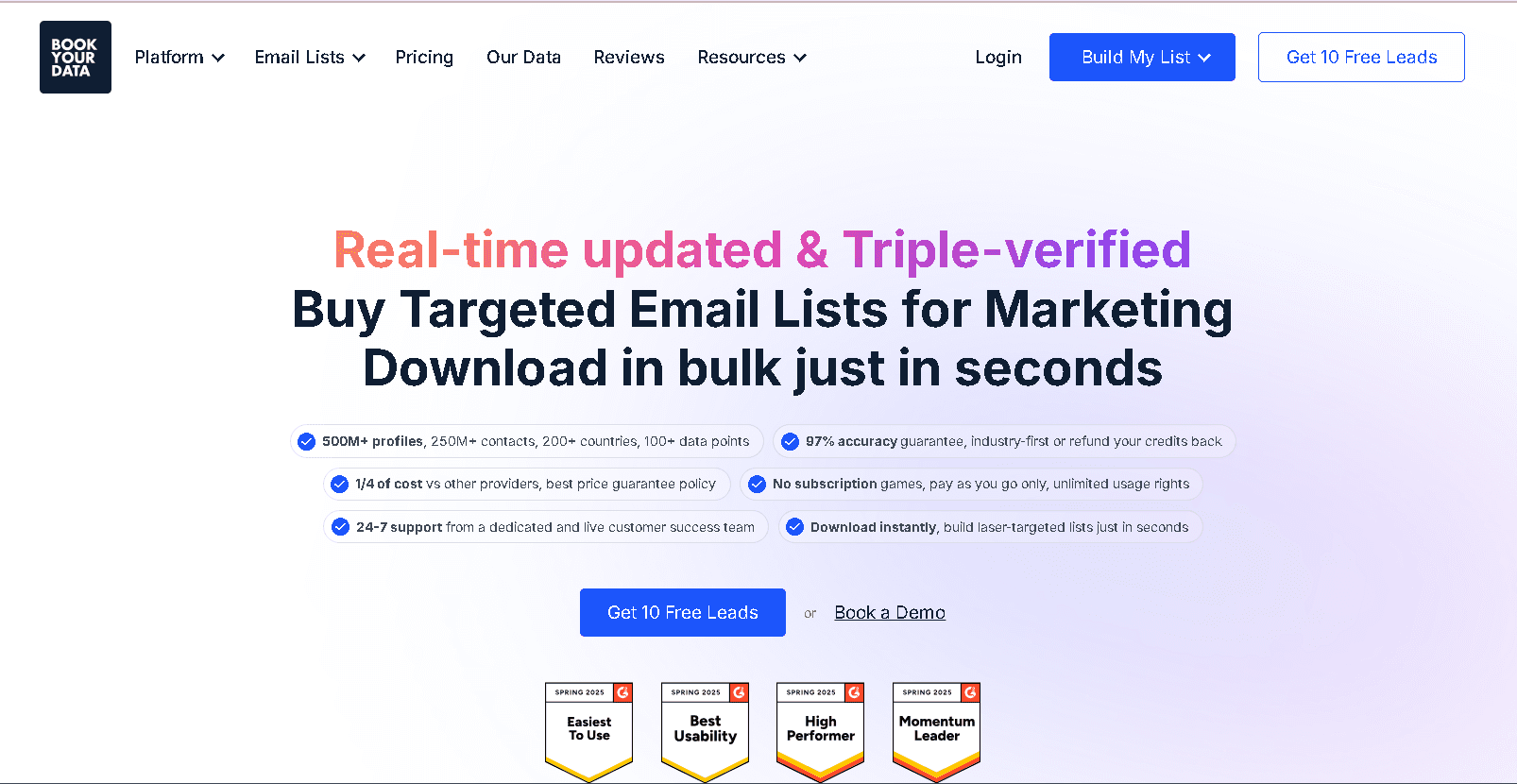Blogs
Articles


8 Best B2B Data Providers That Actually Work in 2026
B2B data providers struggle with a stark reality: 70.3% of B2B data becomes obsolete each year. Your valuable contact information from January could turn worthless by December.
This comprehensive review highlights the top B2B data providers that consistently deliver results in 2025. Each platform brings unique advantages to the table. Some excel in contact database size while others focus on specialized compliance features. Your choice depends on what matters most - global reach, accurate data, or compliance standards.
Let this piece be your compass in the dynamic B2B data marketplace.
What Is a B2B Data Provider?
B2B data providers form the backbone of modern sales and marketing operations. They collect, organize, and distribute valuable business information. These specialized companies gather vital data points about other businesses—from contact details to firmographic information—and make them available to organizations that want to improve their lead generation efforts.
Core Function and Data Types
B2B data providers put together complete information sets that include:
Company characteristics (size, location, industry, and revenue)
Professional contact details (emails, phone numbers, job titles)
Decision-maker information with purchasing power
Technological infrastructure data
Intent signals and buying behaviors
This business intelligence comes from two main sources. Public sources like websites, social profiles, news articles, and email signatures are available freely. Private sources need subscription or payment access and include paywalled websites, financial intelligence platforms, and specialized data-as-a-service providers.
Data Delivery Evolution
B2B data distribution has changed by a lot. Companies used to download static CSV files that needed manual updates and CRM uploads. Modern providers now offer dynamic sales intelligence platforms with automatically refreshed data that combine smoothly with existing tools. These changes address a key challenge—B2B data decays remarkably fast, at approximately 70.3% per year.
Strategic Business Applications
Companies use B2B data providers to:
Identify and target potential customers precisely
Learn about prospect needs and priorities
Create more effective marketing campaigns
Optimize outbound sales strategies
Improve account-based marketing operations
A SaaS company that offers marketing automation software might team up with a data provider to name just one example. They can identify businesses that hired marketing managers recently—creating perfectly timed, personalized outreach opportunities.
Quality Considerations
B2B data providers don't all deliver equal value. The best vendors stand out through:
Data accuracy and verification processes
Freshness and update frequency
Complete industry and geographic coverage
Compliance with global privacy regulations
Integration capabilities with existing tech stacks
8 Best B2B Data Providers and Vendors
Persana, a Y Combinator-backed company, stands out from other b2b data providers. They combine AI technology with data from over 75 sources to make sales prospecting and lead generation easier. Their waterfall enrichment approach gives them an edge in data matching and accuracy over traditional vendors.
Persana Key Features
The platform offers several unique capabilities that separate it from other b2b database providers:
Waterfall Enrichment Technology: Get detailed data from multiple providers through a single platform. You only pay for new information.
Intent Signal Tracking: The system tracks job changes, hiring patterns, funding rounds, and website visits to find high-potential prospects.
AI-Powered Personalization: The system creates custom email and LinkedIn messages at scale. Users often mention this as their best feature.
Quantum Agent Technology: AI agents work around the clock to qualify leads and add tech stack data and decision-maker details to contact lists.
Multi-Source Integration: The platform combines information from 75+ leading data providers through a proprietary orchestration layer.
Persana Pros and Cons
Pros:
Better match rates than Apollo and ZoomInfo combined
Sales professionals save 8-10 hours weekly on prospecting
Every paid plan supports unlimited team members
You get instant alerts when prospects change jobs
Uninterrupted integration with major CRMs like Salesforce and HubSpot
Cons:
Learning the platform takes time
The login process seems unusual to some users
Customer service documentation needs work
Lower-tier plans have fewer integration options
Persana Pricing
The platform offers clear pricing tiers:
Free: Basic features, no credit card needed
Starter: $68/month with 24,000 annual credits
Growth: $151/month includes 60,000 annual credits and more integrations
Pro: $400/month with 216,000 annual credits and advanced webhook integrations
Unlimited: $750/month for unlimited enrichments plus 50,000 credits for external data sources
Best For Using Persana
The platform works great for:
Sales teams targeting growing companies that are hiring actively
Companies looking to cut their sales cycle time by up to 65%
Businesses that want event-driven prospecting based on triggers like new CTO hires
Teams needing to find high-intent prospects through signal-based selling
The platform helps you catch buyers before they reach the RFP stage, especially when you have complex solutions to sell. Visit Persana to see how their waterfall enrichment technology can boost your prospecting results.
Apollo.io stands out as a powerhouse among b2b data providers with its impressive database of over 210 million verified contacts across 35 million companies worldwide. The platform sets itself apart by combining resilient prospecting capabilities with direct outreach functionality in one platform.
Apollo.io Key Features
Apollo's data platform excels through these distinctive capabilities:
Living Data Network: Maintains data accuracy through 2+ million data contributors, email engagement tracking, and proprietary web-crawling algorithms
Advanced Search Precision: Uses 65+ data attribute filters for targeted prospecting
Integrated Engagement Tools: Provides email sequencing, AI-assisted writing, and multi-channel outreach from one interface
Data Verification: Uses a 7-step email verification process to ensure validity, particularly for catch-all domains
Intent Signal Tracking: Spots high-potential prospects who actively research solutions in your space
The platform's Chrome extension boosts functionality and lets users pull data straight from LinkedIn or company websites without tab switching.
Apollo.io Pros and Cons
Pros:
One platform that combines data access with outreach capabilities
Free tier offers 10,000 monthly email credits
Blends with major CRMs including Salesforce and HubSpot
Real-time data enrichment updates automatically with job changes
Better value compared to competitors like ZoomInfo and Lusha
Cons:
Credit system restricts access to direct dials and mobile numbers
Users report occasional data accuracy issues
Platform slows down during peak usage
Customer support takes longer than expected
Professional license at $99/month might be too expensive for freelancers
Apollo.io Pricing
Apollo offers four main pricing tiers:
Free: 10,000 email credits, 5 mobile credits, and basic platform access
Basic: $49/month per user with annual billing, unlimited email credits, 25 mobile credits, and 250 export credits
Professional: $79-99/month per user includes AI-assisted writing, uncapped sending limits, and extra credits
Organization: $119-149/month per user needs minimum 3 users, adds advanced reporting, call transcription, and customizable permissions
Users who switch to Apollo report significant efficiency gains, with some achieving 75% more meetings booked.
Lead411 is a trusted B2B data provider with a reputation for delivering highly accurate contact data and actionable intent signals. The platform helps sales and marketing teams identify prospects at the right buying stage using verified contacts, real-time triggers, and company growth insights. With more than 96% email accuracy and advanced filtering options, Lead411 empowers businesses to engage prospects with precision.
Lead411 Key Features
Lead411’s platform stands out through these capabilities:
Growth Intent Tracking: Surfaces companies undergoing funding, hiring, and geographic expansion for timely outreach.
Triple-Verified Contacts: Ensures accuracy with SMTP checks, human verification, and activity validation, refreshed every 3–6 months.
Advanced Search Filters: Enables targeted prospecting across industries, job titles, company size, and technologies used.
CRM Integrations: Connects seamlessly with Salesforce, HubSpot, Zoho, Outreach, and 25+ other platforms.
Direct Dial Access: Provides verified mobile numbers and direct dials to accelerate sales conversations.
Lead411 Pros and Cons
Pros:
Around 96% deliverability rate, ensuring reliable outreach
Built-in growth intent signals for smarter prospecting
Strong CRM and sales engagement tool integrations
Flexible pricing compared to enterprise-level providers like ZoomInfo
Cons:
Some advanced features limited to higher-tier plans
Pricing may be steep for startups with smaller budgets
Interface can feel less modern compared to newer competitors
Lead411 Pricing
Lead411 offers multiple pricing tiers to fit different business sizes:
Basic: Starts at $99/month with limited contact credits and intent signals
Pro: $199/month with expanded contact access, intent data, and integrations
Enterprise: Custom pricing with full-scale intent tracking, enriched data exports, and team-wide integrations
Businesses using Lead411 report improved targeting efficiency and stronger ROI by engaging prospects during key buying moments.

ZoomInfo leads the pack of b2b data providers in 2025. Its massive database contains 321 million professional profiles and information about 104 million companies worldwide. This 10-year-old platform uses advanced AI technology to give complete business intelligence to sales, marketing, and recruiting teams.
ZoomInfo Key Features
The reliable platform offers these notable capabilities:
AI-Powered Data Analysis: It processes and categorizes vast amounts of information. Teams can focus on high-value prospects through better predictive analytics
Comprehensive B2B Database: The database has over 220,000 professional profiles, 150,000 email addresses, and 100,000 company profiles that update regularly
Advanced Search and Filtering: Users can target precisely based on industry, job title, location, company size, and revenue metrics
CRM Integration: The system blends with popular platforms like Salesforce, HubSpot, and Marketo to optimize workflows without manual data entry
Real-Time Data Verification: The system confirms contact information to reduce email bounce rates and make prospecting more reliable
OperationsOS Suite: The platform's data management features match, unify, deduplicate, normalize, cleanse, and enrich data through codeless orchestration software
ZoomInfo Pros and Cons
Pros:
A reliable customer database with detailed company and contact information
Contact details are verified with accurate phone numbers and email addresses
Intent data helps identify prospects who actively search for services
Advanced search options with detailed filters for precise targeting
Data cleanup tools help keep contact lists accurate
Cons:
Users must schedule a live demo to access the free trial
The free plan shows only 10 contacts
Pricing isn't publicly available
Small businesses might find subscription plans expensive
New users face a steep learning curve with the complex interface
ZoomInfo Pricing
The pricing structure has three main tiers:
Professional Plan: Annual cost starts at $14,995 for up to three users with 5,000 annual bulk credits
Advanced Plan: Yearly cost begins at $24,995, including 10,000 annual bulk credits plus 1,000 monthly user credits
Elite Plan: Annual pricing starts from $39,995 with Advanced plan's credit structure plus premium features
The platform also offers specialized packages for different departments:
Sales (SalesOS): Tools for prospecting, lead generation, and engagement
Marketing (MarketingOS): Better targeting, campaign effectiveness, and informed strategies
Talent (TalentOS): Tools that help recruiters find and connect with candidates

UpLead stands out among b2b data providers with its steadfast dedication to accuracy. The platform guarantees 95% data accuracy in its database of over 160 million B2B contacts spread across more than 200 countries. The company takes a different approach from its competitors. Rather than chasing bigger databases, it delivers verified, high-quality leads that convert.
UpLead Key Features
The platform shines through these notable capabilities:
Real-Time Email Verification: The system verifies every email address right when you download it. This significantly cuts down bounce rates and ensures your emails reach their destination
Extensive Search Capabilities: You get more than 50 specialized filters. These include job title, industry, location, management level, and revenue metrics to help you find exactly who you need
Technographic Data: You can generate qualified leads based on their tech stack, with data covering 16,000+ technologies
Chrome Extension: The tool helps you find verified emails and phone numbers as you browse LinkedIn profiles or company websites
Data Enrichment: The system adds over 50 more data points to your existing contact and company records
Intent Data: You can see what kinds of purchases businesses actively research
UpLead Pros and Cons
Pros:
Data accuracy hits 95% with a solid guarantee
Complete CRM integration works with Salesforce, HubSpot, and Zoho
Mobile direct dials connect you straight to decision-makers
User-friendly interface makes searching simple
Prices stay competitive compared to enterprise options
Cons:
You won't find a mobile app
Credit-based system might restrict high-volume users
Customization options don't cover specific industry needs
Extra credits can get pricey for teams that go over monthly limits
UpLead Pricing
The platform offers clear, credit-based pricing in several tiers:
Free Trial: You get 5 credits over 7 days with simple features
Essentials: $99/month brings 170 credits including verified emails, mobile numbers, and CRM integration
Plus: $199/month gives you 400 credits plus data enrichment, technographics, and advanced filters
Professional: Large organizations can get custom pricing with annual billing, intent data, full API access, and dedicated support
One credit gets you one contact's email and direct dial information. The platform offers extra credits at a discount ($0.50-$0.60 per credit) if you use up your monthly allowance.

Lusha has earned the trust of more than 280,000 companies and leads the pack among b2b data providers with its commitment to compliance and data verification. The platform's database includes over 100 million business email addresses and 60 million decision-maker contacts from 15 million company profiles. Sales professionals can easily find verified contact information they need.
Lusha Key Features
Lusha stands out with these powerful capabilities:
Verified Contact Data: A seven-step verification process ensures business emails and direct phone numbers stay accurate
Chrome Extension: Contact information appears with one click while browsing LinkedIn profiles or company websites
Data Enrichment: Access to 12 detailed contact attributes (including full name, job title, seniority) and 25 company attributes (such as revenue range, employee count, technologies used)
Compliance Focus: The platform holds certifications for GDPR, CCPA, ISO 27701, and ISO 27001, making it "the only fully compliant B2B data provider"
AI-Powered Recommendations: Smart prospect lists based on ideal customer profiles make outreach more effective
Lusha Pros and Cons
Pros:
Top-tier compliance standards protect legal data usage
Immediate verification reduces bounce rates
The accessible interface and Chrome extension make prospecting easier
The platform merges with major CRMs including Salesforce, HubSpot, Zoho, and Pipedrive
Data accuracy improves through contributions from 1.5 million users
Cons:
High-volume users face limits with the credit-based system
The free plan gives only 5 credits monthly
Data accuracy shows inconsistencies sometimes
Lower-tier plans lack customization options
Users can't access a mobile app
Lusha Pricing
The platform uses credits - one credit reveals an email address while phone numbers need 10 credits:
Free: One user gets 5 monthly credits with simple prospecting features
Pro: Users pay $29-39 monthly for 40 credits (480 yearly) plus list management
Premium: Each user pays $51-69 monthly for 80 credits (960 yearly) with bulk show features
Scale: Custom pricing includes unlimited credits (fair usage policy: 2,000-5,000 monthly credits), advanced team management, intent signals, and API access
Monthly plan credits stack up to double your plan's limit. Annual plans give all credits upfront, but unused credits expire at year-end.

Cognism stands out as a Europe-first b2b data provider with unmatched EMEA coverage. The platform provides 180% more contacts in the UK and 250%+ more contacts in France and Germany than competitors like ZoomInfo. Their phone-verified mobile database has become well-known and contains 50 million US mobile numbers—twice ZoomInfo's coverage.
Cognism Key Features
The platform stands apart from other b2b data vendors with these distinctive capabilities:
Diamond Data®: Phone-verified mobile numbers connect with 87% of prospects. Each number is manually called to confirm identity and contact accuracy
Signal Intelligence: Tracks important buying indicators like hiring trends, funding alerts, technology usage across 20,000+ technologies, and M&A activities
Compliance-First Approach: The platform checks 13 global Do-Not-Call lists—more than any competitor. This ensures all data meets GDPR and CCPA requirements
Unrestricted Data Access: The platform lets you export unlimited individual and page-level data (up to 25 records at a time), unlike credit-limited platforms
AI Search: You can find prospects using ChatGPT-style textual or voice prompts for better targeting
Cognism Pros and Cons
Pros:
European data coverage excels for companies moving into EMEA markets
Verified mobile numbers lead to 3X more conversations, so you make fewer calls
Database without personal email addresses helps with compliance
All packages come with major CRM and sales engagement tool integrations
Accessible interface with 99% customer support satisfaction
Cons:
Costs more than some competitors
Diamonds-on-Demand verification limits you to 50 monthly contacts on highest tier plans
Standard pricing structure lacks transparency
Bombora powers intent data, available only as an add-on
Some users report occasional data accuracy issues
Cognism Pricing
Cognism tailors pricing to specific business needs. Here's what you can expect:
Two main packages: Grow and Elevate (includes Signals)
Approximate range: $30,000-$100,000 yearly based on organization size
Pricing structure: You pay a flat platform fee plus per-user licensing costs
No hidden fees: Every package includes onboarding, training, and customer support
Both packages come with contact and company data that includes Diamond Data® contacts. The Elevate package adds advanced intelligence and practical signals to identify in-market accounts.

Seamless.AI has made its mark in the b2b data market from its Columbus, Ohio headquarters. The company maintains a massive database of more than 1.3 billion business contacts from 121 million companies. Their AI-powered approach to real-time data verification sets them apart from competitors.
Seamless.AI Key Features
Seamless.AI stands out among b2b data providers with these distinctive capabilities:
Real-Time Search Engine: The first and only real-time search engine for B2B sales leads that continuously crawls the web to find and confirm contact information
AI Research Technology: The system uses artificial intelligence to search multiple data points on the public web and delivers fresh, confirmed contact details with each search
Complete Integration: The platform connects with one click to Salesforce, HubSpot, Salesloft, Outreach, and Pipedrive. Users can also link to 6,000+ more tools through Zapier
Buyer Intent Feature: The system spots prospects who actively search for your services. This helps you reach decision makers ready to buy
Chrome Extension: Users can build prospect lists while browsing without switching between apps
Seamless.AI Pros and Cons
Pros:
A big database with up-to-the-minute verification improves data accuracy
AI-powered tools make prospecting tasks automatic
Intent data spots high-potential prospects ready to buy
Smooth integration with popular sales tools
Chrome extension makes list building easy from any website
Cons:
Lower-tier plans limit access with credit-based system
Some users question data accuracy at times
Costs are not shown publicly
Multiple customers report auto-renewal problems
Support response times vary based on reviews
Seamless.AI Pricing
The platform offers four pricing tiers, though exact costs aren't publicly displayed:
Free Plan: Users get 50 lifetime credits with simple features
Basic Plan: Users pay around $147/month for 250 monthly credits
Pro Plan: Each user receives 1,000 daily credits at about $99/user/month
Enterprise Plan: Custom pricing comes with individual credit allocation, quarterly business reviews, and a dedicated account manager
Bookyourdata is a fast-growing B2B data provider offering a real-time verified database of over 100 million business contacts across global industries. Its platform makes it simple for sales and marketing teams to buy email lists or build custom datasets using refined filters like job title, seniority, company size, geography, and industry. This ensures that users reach the right decision-makers with fresh, reliable data.
Bookyourdata Key Features
Bookyourdata stands out through these capabilities:
Real-Time Verification: Every email is validated the moment you download it, significantly reducing bounce rates and wasted outreach.
Advanced Segmentation: Users can filter prospects by more than a dozen attributes, allowing pinpoint targeting.
Niche Industry Lists: Access specialized datasets including healthcare professionals, real estate agents, and tech executives.
Instant CSV Export: Clean, ready-to-use files that integrate smoothly with CRMs and cold email tools.
Pay-As-You-Go System: Buy only the contacts you need credits never expire, and no long-term contracts lock you in.
Bookyourdata Pros and Cons
Pros:
Real-time verification provides exceptionally high deliverability
Simple, intuitive interface suitable for all experience levels
Flexible pricing makes it ideal for small teams and large organizations
Accurate niche datasets unavailable through many competitors
No subscription pressure completely usage-based
Cons:
No built-in outreach automation
CRM sync must be done through manual CSV import or Zapier
Bookyourdata Pricing
Bookyourdata uses a pay-as-you-go model:
One credit unlocks one fully verified contact
Discounts for bulk credit purchases (as low as $0.24 per contact)
No monthly or annual commitments
Includes 10 free credits for new users to test data quality
Teams switching to Bookyourdata often see higher deliverability and faster list-building because they only download verified, ready-to-engage contacts.
Extra features like AI Writer, job change alerts, and automatic list building (Autopilot) need additional payment on any plan.
Conclusion
Your specific business requirements and target markets will determine the best B2B data provider for your needs. Data quality and freshness should be your top priorities, especially since 70.3% of data decays each year. Each provider brings something unique to the table - from massive databases to high accuracy guarantees, compliance certifications, and specialized features.
AI-powered verification and intent tracking have become basic features in the fast-changing B2B data world. Start with a provider that offers strong data quality without long-term contracts.
Companies looking to balance AI personalization, data accuracy, and intent tracking can check out Persana's innovative platform. Their waterfall enrichment approach has proven to get better results.
Note that the priciest provider isn't always the best fit for you. Look for a data partner that makes your team more efficient, gives you practical information, and helps you reach decision-makers with accurate contact details quickly.
FAQ
Many businesses ask questions when choosing b2b data providers. Here are the two questions we hear most often from companies looking for data vendors.
Which B2B Data Provider is the Best?
The "best" b2b data provider depends on your business needs. Research shows B2B companies that use analytics are 1.5 times more likely to grow faster than their competitors. Your ideal provider should match your:
Industry and geographic focus - Some providers excel in specific regions (like Cognism in EMEA)
Data quality needs - Companies like UpLead guarantee 95% accuracy
Budget constraints - Prices range from $29/month to $30,000+ annually
Compliance requirements - Vendors check between 1-13 different Do Not Call lists
Start by testing data samples of 100-300 contacts to check accuracy. Then review how well the provider works with your existing tech stack and how open they are about their data collection methods.
How is B2B data used in marketing and sales?
B2B data helps generate revenue across different business functions. Marketing and sales teams use this data to:
Lead generation - Find and target the right companies and decision-makers
Customized outreach - Create relevant messages based on firmographic and technographic data
Account-based marketing (ABM) - Build campaigns for specific high-value accounts
Campaign segmentation - Boost engagement through precise audience targeting


Create Your Free Persana Account Today
Join 5000+ GTM leaders who are using Persana for their outbound needs.
How Persana increases your sales results
One of the most effective ways to ensure sales cycle consistency is by using AI-driven automation. A solution like Persana, and its AI SDR - Nia, helps you streamline significant parts of your sales process, including prospecting, outreach personalization, and follow-up.





